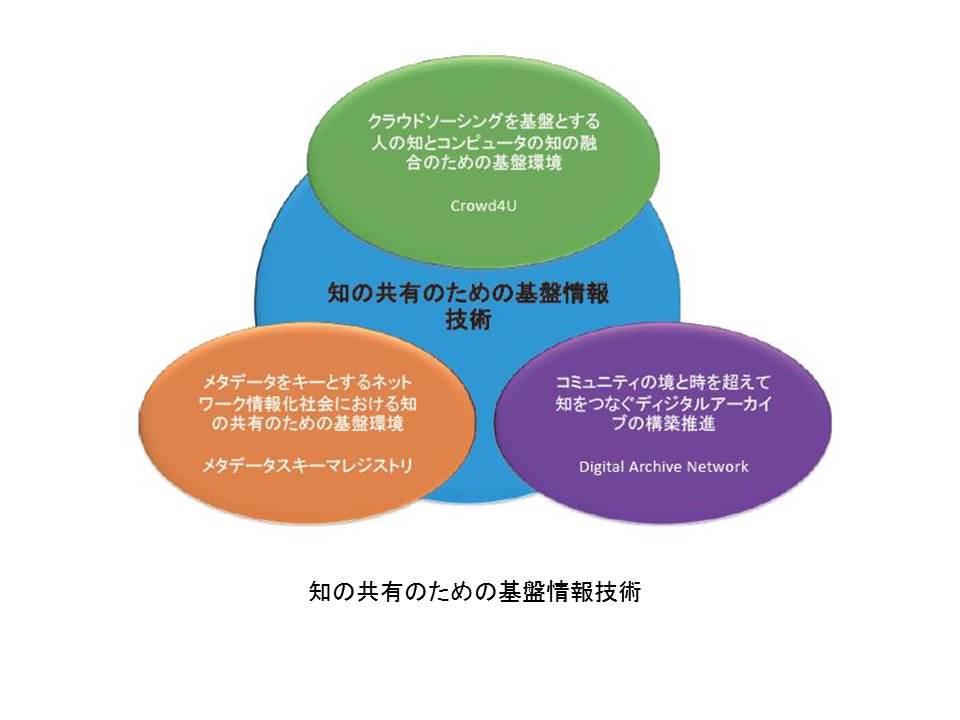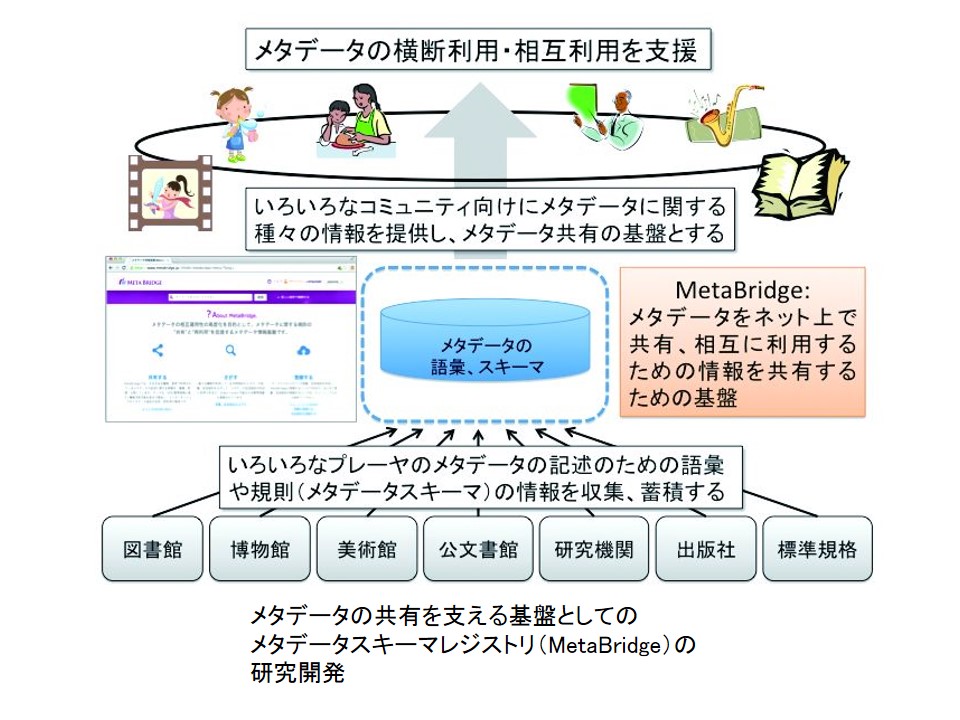キーワード:メタデータ、セマンティックウェブ、ディジタルライブラリ、データ工学、データベース
http://www.kc.tsukuba.ac.jp/div-org/index-j.html
 膨大かつ玉石混合の情報が蓄積されているインターネット上で,適切な情報の流通管理をおこなう事は重要な問題です。リサーチユニット「知の共有基盤」では、ネットワークを基盤とした環境において、情報を蓄積・流通するための情報技術を研究開発しています。ここでいう基盤環境とは、計算機技術によって作り上げられた ものではなく、人間も要素として含む総合的な環境です。さまざまな人が使う情報や知識を、とくにネットワーク環境の下でより使いやすくするために必要となる基盤環境の構築に挑戦中です。
膨大かつ玉石混合の情報が蓄積されているインターネット上で,適切な情報の流通管理をおこなう事は重要な問題です。リサーチユニット「知の共有基盤」では、ネットワークを基盤とした環境において、情報を蓄積・流通するための情報技術を研究開発しています。ここでいう基盤環境とは、計算機技術によって作り上げられた ものではなく、人間も要素として含む総合的な環境です。さまざまな人が使う情報や知識を、とくにネットワーク環境の下でより使いやすくするために必要となる基盤環境の構築に挑戦中です。
クラウドソーシングと人とコンピュータによる問題解決
本リサーチユニットのミッションは、ネットワーク上で知識と情報を得るために必要となる基盤環境を作り上げることです。基盤環境といっても、特定の環境を構築するのではなく、ネットワーク上で知識と情報の共有基盤を構成するミドルウェアを開発したいと考えています。これまで、ネットワーク上では問題解決の 重要な手段としてコンピュータが広く利用されてきましたが、人間でなければ解決が難しい問題というものも世の中には多く存在します。例えば、ウェブにアップロードされた竜巻の写真を集めて、その経路を知りたい場合などです。しかし、その写真に本当に竜巻が写っているか、さらに調べたいと思っている竜巻なのかどうかの判断など、コンピュータには難しいが人にはできるような問題が多くあります。ネットワークを通じて不特定多数の人に仕事を委託する「クラウドソーシング」を通じて人間が得意な判断は人間に行ってもらい、コンピュータは時系列に連動させる作業などの得意な作業を行うことにより、効率的に経路分析が可能になります。

メタデータとディジタルアーカイブ
現代ではインターネット抜きの生活は考えにくいです。インターネットを基盤とする生活を支えるのは「データに関するデータ」であるメタデータです。ネット上のあるお店だけのデータだとその重要性はわかりにくいですが、いろんなデータを組み合わせて使おうと思うと、データの流通性の重要性がわかります。
ネットワーク上ではいろいろな情報を作ってくれる人がいるので、それらをかき集め、付加価値の高い情報を作れます。それには情報を繋ぐことが大事です。そして時を超えて情報を保存することも大事です。そこでもメタデータが重要です。こうした課題の解決に必要となる基盤技術であるメタデータスキーマ・レジストリやディジタルアーカイブの研究を推進しています。

社会への貢献・実績
● 総務省ならびにいくつかの企業との連携により、地域の図書館、博物館など(MLA)によるディジタルアーカイブ推進を目的とするディジタルアーカイブネットワーク(DAN)の推進のための取組み(http://www.kc.tsukuba.ac.jp/dan20120724.htm)
(取材:平成25年10月8日)
To Develop a Foundation for Supporting the Collaborative Creation of Knowledge by Humans and Computers
Unit members : Nagamori, Mitsuharu
Key words: metadata, semantic web, digital library, data engineering, database
As there are large amounts of both valuable and less-valuable information on the Internet, it is very important to properly manage the distribution of information. The research unit “Knowledge Resource  Sharing Technology” develops and conducts research on information technologies to store and distribute information in networked information environments. The goal of our research is an integrated and hybrid information environment where not only computers but also humans are recognized as fundamental factors. We are currently engaged in the development of an information environment as our information infrastructure to improve the usability of information and knowledge for a large number of people sharing the networked information environments.
Sharing Technology” develops and conducts research on information technologies to store and distribute information in networked information environments. The goal of our research is an integrated and hybrid information environment where not only computers but also humans are recognized as fundamental factors. We are currently engaged in the development of an information environment as our information infrastructure to improve the usability of information and knowledge for a large number of people sharing the networked information environments.
Crowdsourcing: problem-solving by humans and computers
The mission of the research unit is to develop a networked information environment for users to obtain knowledge and information. The goal is not the development of any particular environment but the development of middleware that serves as an important component of the infrastructure for sharing knowledge and information. Although computers have been widely used for solving problems, there are many problems that can only be solved by humans. A good example is a research for tracing footprints of a tornado from its photographs uploaded to the Internet. Some tasks in the tracing are too hard for computers but not for humans – to determine whether or not a tornado is in the picture, and to determine whether or not the tornado in the picture is really the tornado that should be studied. Using “crowdsourcing”, a technology to outsource small tasks to a large number of people working independently on the Internet, we can carry out a large task which cannot be done only by computers. In the case of the footprint tracing of a tornado, researchers can conduct efficient analyses of the routes of tornadoes integrating human intelligence of many participants to recognize the footprints and computing power to collect and process information from the participants.

Fundamental information technologies for knowledge resource sharing
Metadata and digital archives
In our modern society, it is difficult to imagine our lives without the Internet. Our lives relying on the information resources on the Internet are supported by metadata – data about data. When you are watching only one net-shop you would not be able to recognize what is metadata and how metadata is important for you. When you are watching two or more net-shops to compare their services you would recognize the importance of metadata because you have to compare the metadata.
Since varieties of information produced by a number of people are available on networks, they can be collected to provide new value-added information. To produce value-added information, it is important to link information and make it available for a long period of time. Metadata are essential for both processes. We have conducted research on metadata schema registry and digital archives – infrastructure technologies required to address those problems.
Social contributions and achievements
● Activities to promote Digital Archive Networks (DAN) for community memory institutions (Museums, Libraries, and Archives: MLA) in collaboration with the Ministry of Internal Affairs and Communications and other public and private sectors. http://www.kc.tsukuba.ac.jp/dan20120724.htm

